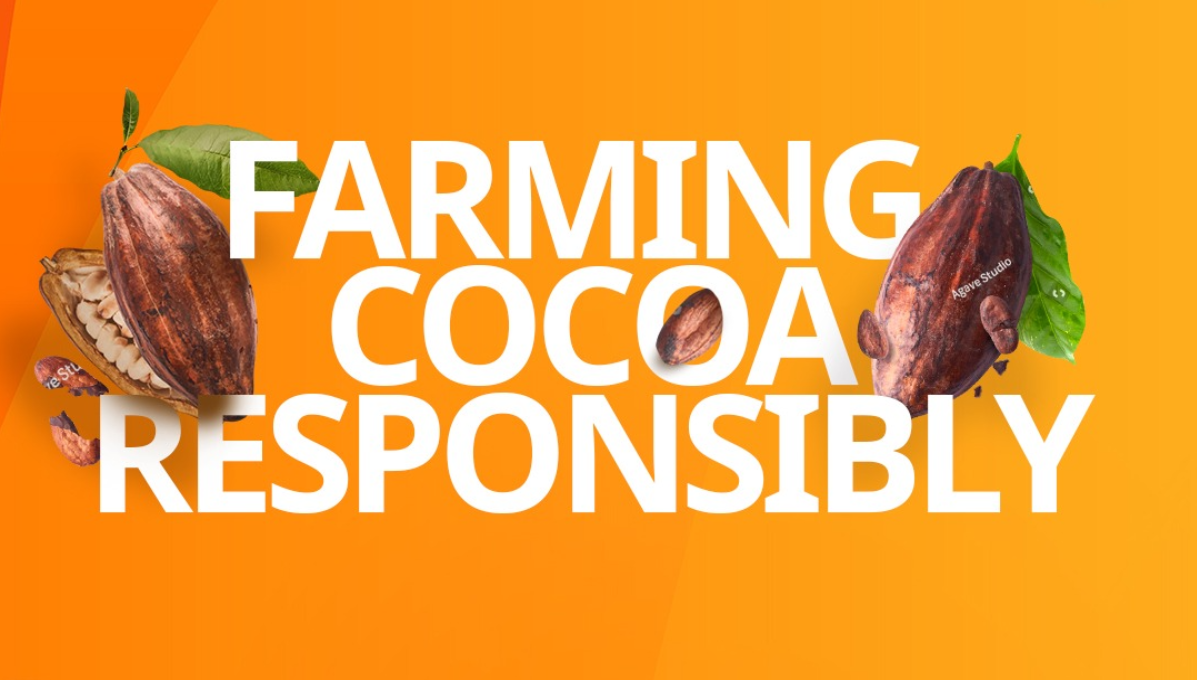Behind the chocolate bars and rich flavoured drinks made with cocoa powder are the cocoa farmers who grow and harvest these beans, with 70% of them in the West African countries of Ivory Coast, Ghana, Cameroon, Nigeria, and Togo. A majority of these are smallholder farmers with a typical cocoa farmer using just an average of 2.5 hectares of land to support a family of 6-8 members. Cocoa farming has been in their family for generations but their outdated farming practices and lack of access to modern technology and inputs or infrastructure prevents them from increasing their income, keeping them stuck in cycles of poverty. The low yield (an average of 500 kg/ha) makes more than 50% of farmers live far below the poverty line (0.78$/day). Helping these cocoa farmers create sustainable livelihoods doesn’t just increase the yields and raise the incomes that support their communities, it also helps shift the cocoa industry towards a more sustainable future.
Working Together Towards Sustainable Cocoa Farming
For over three decades, we have worked closely with smallholder farmers across the entire cocoa value chain to develop unique high-quality inputs, training programmes, and services that contribute to sustainable development. With our experience, we’ve also realized that we can see more results in this sector by collaborating with other players in the value chain since cocoa farming also has a larger environmental impact which also needs to be addressed on a broader scale.
We are proud to have partnered with Barry Callebaut, Olam, and Cargill over the last two years, leading impactful diversification projects to enhance cocoa farmers’ prosperity, resilience, and income. The crop diversification projects we have been undertaking with our partners have already reached over 5,300 farmers across Côte d'Ivoire and Ghana. We have seen promising results from our engagement, with smallholders both increasing and diversifying their income sources through growing a variety of food crops. The farmers producing peppers achieved a net profit of $476 per hectare, whilst those cultivating okra and eggplant obtained an impressive net profit of $1,700 and $5,755 per hectare, respectively.
Between 2002-2019, 25% of the primary forest in Côte d’Ivoire and 8% in Ghana was lost, with a significant part of the deforestation related to cocoa farming. Mainly cocoa farming is responsible for 38% of forest lost in Côte d’Ivoire. World Cocoa Foundation has been helping growers produce cocoa sustainably and it started the Cocoa & Forests Initiative (CFI) in 2019 to eliminate cocoa-related deforestation with UPL as one of its signatories. World Cocoa Foundation reports that 10 million trees were planted in Côte d’Ivoire and 226,000 hectares of forest area were restored in Ghana last year despite the challenges of the pandemic.
This initiative also includes efforts to teach growers about sustainable cocoa farming practices, help combat the social challenges that the growers face, strengthen the supply chain so it can be mapped at a farm level, and promote long-term conservation of forest areas. It is already having positive effects on the community and changing the way that cocoa farmers approach production. In the 2020 Annual Progress Report for the initiative, Hamidu Isaka, a Community Development Manager for a chocolate and cocoa company that is a member of CFI says when speaking about the impacts in Ghana, “When farmers see the end results of applying good agricultural practices, it enables them to look beyond this season’s crop, and to a more sustainable farming future. They see that increasing cocoa yield with the same amount of land is possible.”
Earlier this year, UPL also joined the European Cocoa Association (ECA), a trade organisation headquartered in Belgium which monitors and reports on regulatory developments of primary concern to the cocoa sector, including food safety, trade, logistics, sustainability, environment, and labelling. With its new membership in the ECA, we hope to make new partnerships with food chain stakeholders in the European community and improve the overall sustainability of the cocoa value chain between the European Union and West and Central Africa.
Innovating For Sustainable Cocoa Farming
Our efforts to provide value to cocoa growers also extend into creating products to meet their needs. UPL collaborated with Croda International Plc to create the first biostimulant foliar spray specifically designed for cocoa farming - BANZAI. This environmentally-friendly biostimulant is developed with patented Alethea™ anti-stress technology which makes the plants more resilient to environmental stress and increases production and retention of the pods. BANZAI can be used along with other agrochemical foliar sprays and doesn’t have any negative effects on the cocoa beans, which means no difference in taste or quality of the cocoa pastes, and ultimately, the chocolates that it creates.
BANZAI delivered an average of 37% increase in yield during its trials, which resulted in increasing the incremental income of over $200 per hectare for the average cocoa farmer. Siriki Soro, an Ivory Coast smallholder cocoa grower who used the product, was able to even set up his own shop to sell his increased cocoa yields. In his own words, he says, “BANZAI changed my life.” We are focusing on spreading awareness of the benefits of this biostimulant on cocoa-growing to more West African farmers and expanding its availability in more cocoa-growing regions in the world like Indonesia.
Our dedication to sustainable cocoa farming is a part of our OpenAg vision to create sustainable growth for all. We hope to see a significant change in cocoa agriculture and have every cocoa bean produced sustainably. We’ll continue to work with organizations such as the World Cocoa Foundation and European Cocoa Association as well as increase the reach of our own initiatives to enhance the lives of cocoa farmers and grow the world’s cocoa supply sustainably.
